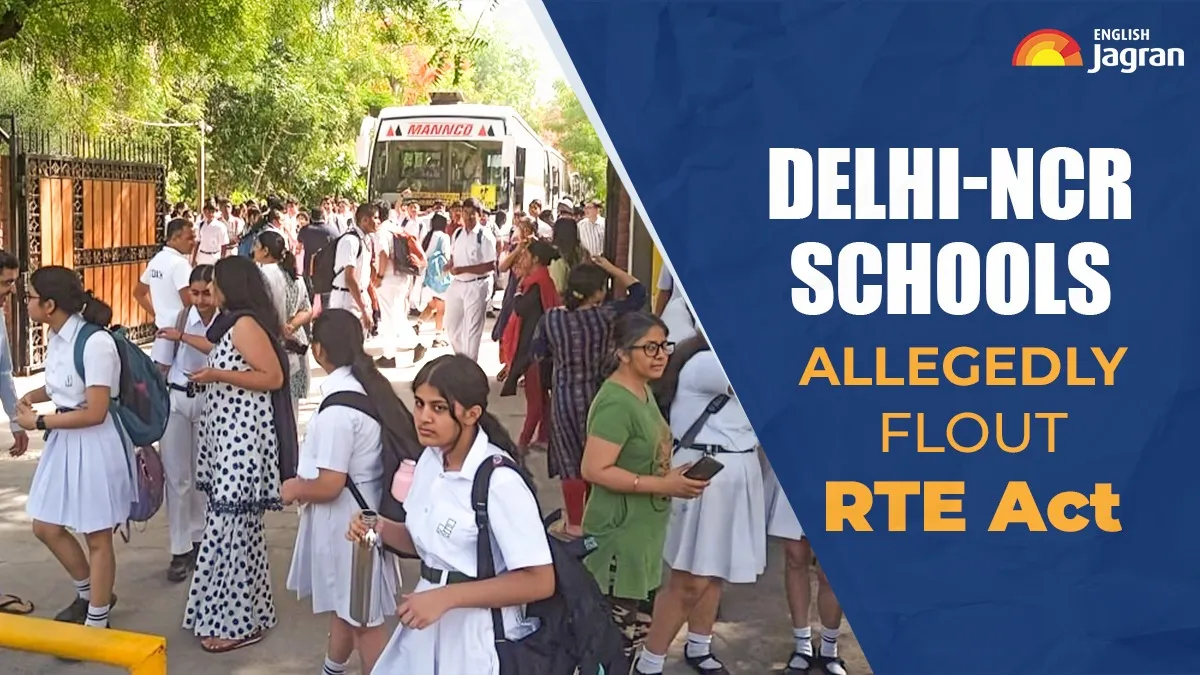- By Sarju Saran Tiwari
- Sun, 20 Apr 2025 04:02 PM (IST)
- Source:JND
Right to Education Act: The controversy surrounding student detention in Delhi-NCR schools has intensified as education activists and concerned parents come forward with allegations that multiple prestigious educational institutions are violating the Right to Education (RTE) Act of 2009. According to reports, these schools are allegedly holding back students in Classes 6 and 7, despite clear legal provisions that permit detention only at specific grade levels.
The issue has gained significant attention after the Department of School Education and Literacy under the Ministry of Education notified updated rules regarding 'Examination and Holding Back in Certain Cases' in December 2024. These rules came following amendments to the RTE Act in 2019, which modified the previous "no detention policy" that had been in effect for students up to Class 8.
Understanding the Legal Framework of Student Detention
Advocate and education activist Ashok Aggarwal explained the current legal position to PTI: "The amended rules allow schools to detain students in Classes 5 and 8 only, that too after giving them additional opportunity for re-examination within two months from the date of declaration of results." He further clarified that before the 2019 amendment, there was a complete no-detention policy for students up to Class 8, but the revised Act now permits detention specifically at the 5th and 8th grade levels.
Section 16A of the RTE Act clearly stipulates that regular examinations should be conducted in Classes 5 and 8 at the end of every academic year. If a student fails to meet the promotion criteria, they must be given an additional opportunity for re-examination within two months from the result declaration date. Only if a child fails this re-examination can they be held back in Class 5 or 8, as applicable.
Parents' Concerns and Experiences
Several parents have come forward with troubling accounts of how schools are handling student progression. Many report being given ultimatums by school authorities – either take a school leaving certificate or allow their child to repeat Classes 6 or 7, despite this practice being explicitly prohibited by law.
One parent from Gurgaon, speaking anonymously, shared: "My son is in Class 6 and we have been told that if he does not clear the re-exam scheduled in May, he will not be promoted to the next class. But norms say that students cannot be detained in classes other than 5 and 8. My son couldn't score well due to bad health this year."
This experience appears to be shared by numerous families across the National Capital Region, with many feeling pressured by educational institutions that should be upholding, rather than circumventing, educational laws.
Expert Opinions and Recommendations
Education professionals have expressed concern about these alleged violations. Prof. Anita Rampal, formerly associated with the Faculty of Education at Delhi University, described the situation as a "blatant disregard for the Act by public schools." She advised affected parents to "file complaints in the nearest district or session courts," emphasizing that "schools must understand that the Act gives certain constitutional rights to children."
Ashok Ganguly, former chairman of the Central Board of Secondary Education (CBSE), provided additional insight, stating that "neither the Right to Education Act nor the National Education Policy and the National Curriculum Framework allow any school to detain a student in Classes 6 and 7." He further suggested that even detention in Classes 5 and 8 remains questionable at this stage due to the absence of properly established procedures by state governments and education boards.
Impact of Detention on Students
The educational impact of detention on young students cannot be overlooked. According to documentation from the Department of School Education and Literacy, compelling a child to repeat a class can be severely demotivating and potentially harmful to their educational journey.
The department's guidance states: "Repeating a class does not give the child any special resources to deal with the same syllabus requirements for yet another year. Parents and friends of such children also tend to view them as being 'fit for failure', thereby reinforcing the school's perception while declaring a child 'fail'."
This perspective aligns with modern educational philosophy that emphasizes continuous and comprehensive evaluation procedures that are non-threatening and free from the fear and trauma of failure.
How to Check Your Child's Rights Under RTE Act
If you believe your child's school may be violating provisions of the RTE Act regarding detention policies, here are steps you can take:
Familiarize yourself with the specific provisions of the RTE Act, particularly Section 16A regarding detention policies
Request written documentation from the school about their promotion policies and retention decisions
Contact your state's Education Department or RTE cell to report potential violations
Consider reaching out to education activists or legal aid services specializing in education law
File a formal complaint with the District Education Officer if violations persist
As a last resort, consider legal action through district or session courts
For detailed information about the Right to Education Act and its provisions, parents can visit the official Ministry of Education website at education.gov.in or contact their state's dedicated RTE implementation cell.
Current Implementation Status:
Following the 2019 amendment to the Right to Education Act, at least 18 states and Union Territories have officially moved away from the complete "no-detention policy" for Classes 5 and 8. These include Assam, Bihar, Gujarat, Himachal Pradesh, Jharkhand, Madhya Pradesh, Meghalaya, Nagaland, Punjab, Rajasthan, Sikkim, Tamil Nadu, Tripura, Uttarakhand, West Bengal, Delhi, Dadra and Nagar Haveli, and Jammu and Kashmir.
Ministry of Education officials, when questioned about the five-year gap between the 2019 amendment and the December 2024 notification, explained that the introduction of the new National Education Policy shortly after the amendment contributed to the implementation timeline.
